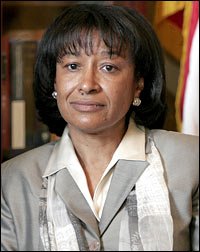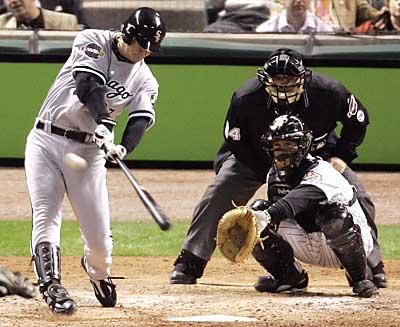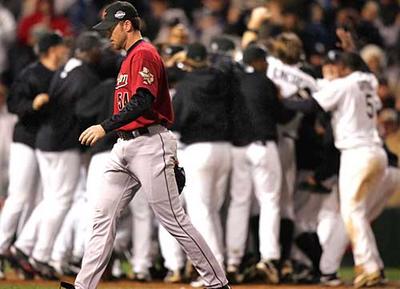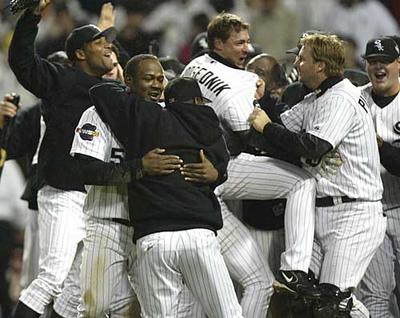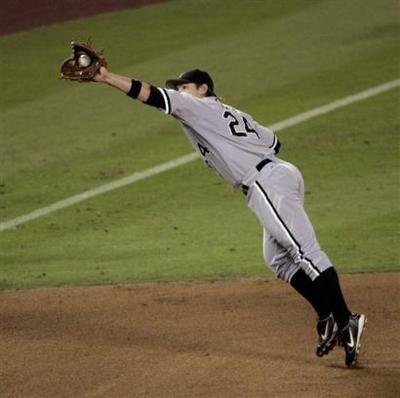Janice Rogers Brown: “Where government advances—and it advances relentlessly—freedom is imperiled...When did government cease to be a necessary evil and become a goody bag to solve our private problems?”
Thomas Paine: “Society in every state is a blessing, but Government, even in its best state, is but a necessary evil; in its worst state, an intolerable one.”
George Mason: “Every society, all government, and every kind of civil compact therefore, is or ought to be, calculated for the general good and safety of the community. Every power, every authority vested in particular men is, or ought to be, ultimately directed at this sole end; and whenever any power or authority whatever extends further...than is in its nature necessary for these purposes, it may be called government, but it is in fact oppression.”
Thomas Jefferson: ‘What more is necessary to make us a happy and a prosperous people?...a wise and frugal Government, which shall restrain men from injuring one another, shall leave them otherwise free to regulate their own pursuits of industry and improvement, and shall not take from the mouth of labor the bread it has earned. This is the sum of good government...”
Janice Rogers Brown: “Where government moves in, community retreats, civil society disintegrates and our ability to control our own destiny atrophies.”
Thomas Paine: “Some writers have so confounded society with government, as to leave little or no distinction between them; whereas they are not only different, but have different origins. Society is produced by our wants, and government by our wickedness; the former promotes our happiness positively by uniting our affections, the latter negatively by restraining our vices...The first is a patron, the last a punisher.”
Thomas Jefferson: “The right of self-government does not comprehend the government of others.”
George Washington: “It will be found an unjust and unwise jealousy to deprive a man of his natural liberty on the supposition that he may abuse it.”
Janice Rogers Brown: “All perspectives are not equal...there are ideas worth defending to the death... Freedom is not free. And it will never be the lasting legacy of the lazy or the indifferent.”
James Wilson: “Government...should be formed to secure and enlarge the exercise of the natural rights of its members; and every government, which has not this in view, as its principal object, is not a government of the legitimate kind.”
George Mason: “...no free government, or the blessings of liberty, can be preserved to any people but by… frequent recurrence to fundamental principles.”
Benjamin Franklin: “Freedom is not a gift bestowed upon us by other men, but a right that belongs to us by the laws of God and nature.”
Janice Rogers Brown: In his famous, all too famous, dissent in Lochner, Justice Holmes wrote that the ‘constitution is not intended to embody a particular economic theory, whether of paternalism and the organic relation of the citizen to the State or of laissez faire’...he was simply wrong.”
Thomas Jefferson: “The legitimate powers of government extend to such acts only as are injurious to others.”
George Washington: “Liberty will find itself...where the Government... [will] maintain all in the secure and tranquil enjoyment of the rights of person and property.”
James Madison: “The real measure of the powers meant to be granted to Congress by the Constitution is to be sought in the specifications... not...with a latitude that, under the name or means for carrying into execution a limited Government, would transform it into a Government without limits.”
Janice Rogers Brown: “...collectivism was (and is) fundamentally incompatible with the vision that undergirded this country’s founding. The New Deal, however, inoculated the federal Constitution with a kind of underground collectivist mentality. The Constitution itself was transmuted into a significantly different document...”
Patrick Henry: “...liberty ought to be the direct end of your government.”
Thomas Jefferson: “The true foundation of republican government is the equal right of every citizen in his person and property and in their management.”
Samuel Adams: “...it is the greatest absurdity to suppose it in the power of one, or any number of men, at the entering into society, to renounce their essential rights, or the means of preserving those rights. “
Janice Rogers Brown: “At its founding and throughout its early history, this regime revered private property ...The Founders viewed the right of property as ‘the guardian of every other right.’”
John Adams: “Property must be secured, or liberty cannot exist.”
James Madison: “The diversity in the faculties of men, from which the rights of property originate...The protection of these faculties is the first object of government.”
George Mason: “Frequent interference with private property and contracts...must disgust the best and wisest part of the community, occasion a general depravity of manners, bring the legislature into contempt…”
Janice Rogers Brown: “Protection of private property was a major casualty of the Revolution of 1937...Rights were reordered and property acquired a second class status. If the right asserted was economic, the court held the Legislature could do anything it pleased...Something new, called economic rights, began to supplant the old property rights...With the advent of ‘economic rights,’ the original meaning of rights was effectively destroyed. These new ‘rights’ imposed obligations, not limits, on the state. It thus became government’s job not to protect property but, rather, to regulate and distribute it.”
James Madison: “In a just and free government...the rights both of property and of persons ought to be effectually guarded.”
John Adams: “The moment the idea is admitted into society that property is not as sacred as the laws of God, and that there is not a force of law and public justice to protect it, anarchy and tyranny commence. If ‘Thou shalt not covet’ and ‘Thou shalt not steal’ were not commandments of heaven, they must be made inviolable precepts in every society before it can be civilized or made free.”
Thomas Jefferson: “It [is]...ridiculous to suppose that a man had less rights in himself than one of his neighbors, or indeed all of them put together. This would be slavery, and not that liberty which the bill of rights has made inviolable, and for the preservation of which our government has been charged.”
Janice Rogers Brown: “Once again a majority of this court has proved that ‘if enough people get together and act in concert, they can take everything and not pay for it.’ But theft is theft. Theft is theft even when the government approves of the thievery...The right to express one’s individuality and essential human dignity through the free use of property is just as important as the right to do so through speech, the press, or the free exercise of religion.”
Thomas Jefferson: “To take from one...in order to spare to others...is to violate arbitrarily the first principle of association--the guarantee to every one of a free exercise of his industry and the fruits acquired by it.”
John Adams: “Each individual of the society has a right to be protected by it in the enjoyment of his life, liberty, and property...no part of the property of any individual can, with justice, be taken from him, or applied to public uses, without his own consent...”
John Dickinson: “…we cannot be HAPPY, without being FREE...we cannot be free, without being secure in our property... we cannot be secure in our property, if, without our consent, others may, as by right, take it away...”
Janice Rogers Brown: “Government acts as a siphon, extracting wealth, creating privilege and power, and redistributing it.”
John Dickinson: “…the single question is whether [government] can legally take money out of our pockets, without our consent. If they can, our boasted liberty is but ‘sound and nothing else.’”
Thomas Paine: “We still feel the greedy hand of government thrusting itself into every corner and crevice of industry, and grasping at the spoil of the multitude. Invention is continually exercised to furnish new pretenses for revenue and taxation. It watches property as its prey and permits none to escape without a tribute.”
George Washington: “[government] has no more right to put their hands into my pockets, without my consent, than I have to put my hands into yours...”
Janice Rogers Brown: “...the Constitution, once the fixed chart for our aspirations, has been demoted...”
Alexander Hamilton: “...the courts of justice are to be considered as the bulwarks of a limited Constitution against legislative encroachments.”
Thomas Jefferson: “No man has a natural right to commit aggression on the equal rights of another, and this is all from which the laws ought to restrain him.”
James Madison: “...laws are unconstitutional which infringe on the rights of the community...government should be disarmed of powers which trench upon those particular rights...”
Janice Rogers Brown: “[T]he courts overcame these alleged limitations on their powers with ridiculous ease. How? By constitutionalizing everything possible, finding constitutional rights which are nowhere mentioned in the Constitution. By taking a few words which are in the Constitution like “due process” and “equal protection” and imbuing them with elaborate and highly implausible etymologies; and by enunciating standards of constitutional review which are not standards at all but rather policy vetoes, i.e., strict scrutiny and the compelling state interest standard.”
Alexander Hamilton: “The complete independence of the courts of justice is peculiarly essential in a limited Constitution...which contains certain specified exceptions to the legislative authority...Limitations of this kind can be preserved in practice no other way than through the medium of courts of justice, whose duty it must be to declare all acts contrary to the manifest tenor of the Constitution void. Without this, all the reservations of particular rights or privileges would amount to nothing...No legislative act, therefore, contrary to the Constitution can be valid. To deny this would be to affirm...that men acting by virtue of powers may do not only what their powers do not authorize, but what they forbid...whenever a particular statute contravenes the Constitution, it will be the duty of the judicial tribunals to adhere to the latter...to guard the Constitution and the rights of individuals...”
James Madison: “...the powers of the federal government are enumerated...it has legislative powers on defined and limited objects, beyond which it cannot extend its jurisdiction.”
Thomas Jefferson: Our legislators are not sufficiently apprised of the rightful limits of their power: that their true office is to declare and enforce only our natural rights and duties and to take none of them from us.”
Janice Rogers Brown: We are heirs to a mind-numbing bureaucracy; subject to a level of legalization that cannot avoid being arbitrary, capricious, and discriminatory. What other outcome is possible in a society in which no adult can wake up, go about their business, and return to their homes without breaking several laws?”
Benjamin Franklin: “In free governments, the rulers are the servants and the people their superiors and sovereigns. “
Thomas Paine: “When I contemplate the natural dignity of man…I become irritated at the attempt to govern mankind by force and fraud, as if they were all knaves and fools…”
Thomas Jefferson: “...rightful liberty is unobstructed action according to our own will within limits drawn around us by the equal rights of others. I do not add ‘within the limits of the law,’ because law is often but the tyrant’s will, and always so when it violates the right of an individual.”
Janice Rogers Brown: “Curiously, in the current dialectic, the right to keep and bear arms—a right expressly guaranteed by the Bill of Rights—is deemed less fundamental than implicit protections the court purports to find in the penumbras of other express provisions. But surely, the right to preserve one’s life is at least as fundamental as the right to preserve one’s privacy.”
Samuel Adams: “Among the natural rights of the colonists are these: first, a right to life; secondly, to liberty; thirdly to property; together with the right to support and defend them in the best manner they can.”
James Wilson: “The defense of one’s self, justly called the primary law of nature, is not, nor can it be, abrogated by any regulation...”
James Dickinson: “For WHO ARE A FREE PEOPLE? Not those, over whom government is reasonable and equitably exercised, but those, who live under a government so constitutionally checked and controlled, that proper provision is made against its being otherwise exercised.”
Janice Rogers Brown: “If we are committed to a rule of law that applies equally to ‘minorities as well as majorities, to the poor as well as the rich,’ we cannot countenance standards that permit and encourage discriminatory enforcement.”
Benjamin Franklin: “An equal dispensation of protection, rights, privileges, and advantages, is what every part is entitled to, and ought to enjoy...”
James Madison: “...it would be the interest of the majority in every community to despoil and enslave the minority of individuals...re-establishing, under another name and a more specious form, force as the measure of right...”
Thomas Jefferson: “...the minority possess their equal rights, which equal laws must protect, and to violate would be oppression.”
Janice Rogers Brown: “Liberty was sacrificed for the common good, and eventually calcified into the tyranny of the State above all.”
George Washington: “It has always been my creed that we should not be left as an awful monument to prove, ‘that Mankind, under the most favorable circumstances, are unequal to the task of Governing themselves, and therefore made for a Master.’”
James Madison: “If Congress can employ money indefinitely...the powers of Congress would subvert the very foundation, the very nature of the limited government established by the people of America.”
Thomas Jefferson: “A sound spirit of legislation...banishing all arbitrary and unnecessary restraint on individual action, shall leave us free to do whatever does not violate the equal rights of another.”
Janice Rogers Brown’s “extremism” is the same extremism that led to the founding of America as the home of liberty. The only real differences are that they began “the land of the free” and she is trying to preserve it; that they were establishing precedents of individual rights and liberty never before seen and she is trying to maintain them, as enshrined in our founding documents. In particular, she has been dedicated to protecting citizens’ rights from government abuse, which was the primary purpose of the Constitution, as our founders also made clear.
Thomas Paine: “All power exercised over a nation…must be either delegated, or assumed…All delegated power is trust, and all assumed power is usurpation.”
John Adams: “There is danger in all men. The only maxim of a free government ought to be to trust no man living with power to endanger the public liberty.”
Samuel Adams: “...without liberty and equality [under the law], there cannot exist that tranquility of mind, which results from the assurance of this to every citizen, that his own personal safety and rights are secure...it is the end and design of all free and lawful Governments.”
It is clear that those who have painted Janice Rogers Brown as an extremist are only correct insofar as those who first thought through, sought out and fought for Americans’ liberty are extremists. But that “extremism in defense of liberty” (in Karl Hess’ words) is no threat to modern Americans. It only threatens those who would sacrifice our liberty to lesser ends under the guise of a “living Constitution.”

